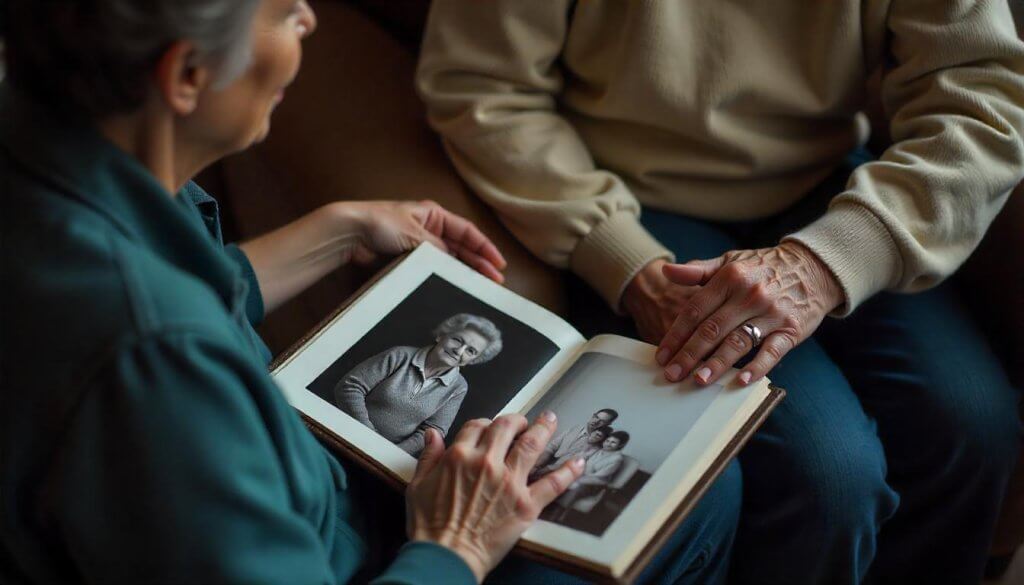年老いた両親や親戚を介護するという決断は、深い愛と献身を意味する。多くのパートナーにとって、この旅は共有の努力となり、予期せぬ形で二人の関係を変化させる。この独特のダイナミズムは、しばしば 夫婦の高齢者ケア高齢者ケアは、大きな挑戦であると同時に、大きなやりがいのある機会でもある。高齢者のケアという複雑な状況をナビゲートしながら、あなた自身の関係の強さを維持するには、回復力、思慮深い計画、そして揺るぎない相互支援が必要です。
実際、介護の責任が加わると、パートナーシップに新たなストレス要因が生じる可能性がある。時間、経済、そして感情的なエネルギーが手薄になることも多い。しかし、共同介護が一体となって取り組まれることで、パートナー同士の絆が深まり、思いやりやチームワークの新たな側面が見えてくることもある。この記事では、老老介護を夫婦で成功させるためのユニークな力学、共通の課題、重要な戦略を探る。愛する家族に必要不可欠なサポートを提供しながら、強く健全な関係を維持するための実践的なアドバイスを提供する。
共同介護のユニークな力学
パートナーの片方の親やお互いの親族に介護が必要になった場合、夫婦は責任を共有するという新たな段階に入る。このダイナミズムは個人の介護とは異なる。それは日常生活の展開を形作る。
特に実の親であれば、当初は一方のパートナーの負担が重くなることが多い。しかし、もう一方のパートナーへの間接的な影響は否定できない。時間、柔軟性、感情的な余裕も影響を受ける。したがって、最初からこの影響を共有することを認識することが重要である。高齢者のケアに単独で取り組むのではなく、一体となったチームとして取り組むことで、憤りや燃え尽きを防ぐことができる。これは、期待や貢献についてオープンに話し合うことを意味する。
さらに 夫婦の高齢者ケア を適応させる必要がある。デートの頻度が減り、趣味がおろそかになり、自発性が失われることもある。その結果、パートナーは自分たちの関係を維持するために意識的に努力する必要がある。介護が必要な中でも、お互いのために時間を割かなければならない。この共同作業が介護のパートナーシップを強化する。また、2人の間の第一の絆も強化される。このような積極的なアプローチにより、介護の役割のために関係が二の次になることはありません。
夫婦の高齢者ケアに共通する課題
高齢者の介護の要求は、人間関係に大きな緊張をもたらす可能性がある。こうした共通の課題を認識することが、効果的に対処するための第一歩である。
感情的な緊張は蔓延している。高齢者の健康状態の悪化に対する悲嘆、ケア不足に対する罪悪感、さらには要求に対する憤りなどが重くのしかかる。繰り返される質問や挑戦的な言動から不満が生じることも多い。こうした激しい感情は、夫婦の関係にも波及することがある。
時間的な要求も計り知れない。介護はしばしば個人の時間を消費し、個人の趣味の機会を減らし、パートナー間の親密さを著しく制限する。リラックスしたり、人とつながったりする時間を見つけることは、常に苦労することになる。このような個人的な空間や夫婦の時間の不足は、疲労につながる可能性がある。
経済的な負担も重大な懸念事項である。高齢者の介護にかかる費用は、医療品、在宅支援、施設利用料など、かなりの額になる。そのため、労働時間を減らしたり、貯蓄を取り崩したりしなければならなくなり、夫婦の安心感に影響を与える経済的圧力が生じる可能性がある。
さらに、介護哲学の相違が摩擦を引き起こすこともある。高齢者の健康状態、日常生活、あるいは境界線に対する最良のアプローチについて、パートナーの意見が食い違うかもしれない。一方はより手厚いアプローチを好み、もう一方はより自立を信じるかもしれない。このような意見の相違は、口論やストレスにつながる可能性がある。最終的には、夫婦のアイデンティティがパートナーから主に介護者へと移行し、自発性や個人的なつながりが失われることになる。こうした面を管理するにはかなりの努力が必要だ。そのため、次のようなことに対処する必要がある。 夫婦の高齢者ケア レジリエンスと明確なコミュニケーションが求められる。
重要なコミュニケーション戦略
効果的なコミュニケーションは、マネジメントの要である。 夫婦の高齢者ケア に成功した。誤解を防ぎ、相互扶助を育む。
何よりもまず、オープンで正直な対話をすること。パートナーはともに、自分のニーズ、恐れ、フラストレーションを批判されることなく安心して表現しなければならない。これは、疲れ、悲しみ、怒りについて弱音を吐くことを意味する。積極的な傾聴も同様に重要である。パートナーが表現していることに真摯に耳を傾け、たとえ相手の考え方に完全に同意できなくても、相手の気持ちを認めましょう。相手が話している間は、話を遮ったり、返答を考えたりしないようにしましょう。
定期的なチェックインを予定する。毎日または毎週、介護の仕事、感情的な幸福、人間関係のニーズについて話し合う専用の時間を設けることが重要である。こうすることで、問題が膿むのを防ぎ、両方のパートナーが話を聞いてもらえたと感じることができる。この時間は気が散らないようにする。
さらに、非難や恨みは避けること。問題が起きたときに指を指すのではなく、一緒に解決策に集中する。どうすれば 我々 を「なぜ解決したのか? あなた どうする?"この協力的なアプローチはパートナーシップを強化する。最後に、ケアを受ける人自身とコミュニケーションをとること。可能な限り意思決定に参加させ、高齢者の自主性を尊重しながら、安全と幸福を確保する。この包括的なアプローチは、高齢者が大切にされていると感じるのに役立つ。明確なコミュニケーションは、介護の旅に関わるすべての人に利益をもたらします。
責任とリソースの共有
ナビゲートに成功 夫婦の高齢者ケア には、公平な役割分担と利用可能なリソースの賢い活用が必要である。そうすることで、一方のパートナーが圧倒されるのを防ぐことができる。
個人の得意分野や好みに応じて仕事を分担することから始める。一方のパートナーは、診察の予約や薬の管理が得意かもしれない。もう一方は、資金計画や身の回りの世話が得意かもしれない。このように長所を生かすことで、仕事の負担が軽くなります。ニーズは急速に変化する可能性があるため、柔軟性も不可欠である。
さらに、外部のサポートを求めることもためらわないでほしい。レスパイト・ケアであれ、日常的な介助であれ、プロの介護者は負担を大幅に軽減することができる。成人のためのデイ・プログラムや高齢者支援グループなどの地域資源は、介護される人にさらなる助けと社会参加を提供する。テクノロジー・ソリューションもまた、貴重なものとなる。これには、服薬リマインダー用のアプリ、家族のためのコミュニケーション・プラットフォーム、安全監視用のスマートホーム・デバイスなどが含まれる。
最後に、包括的な資金計画を立てること。介護費用について率直に話し合う。介護保険、政府からの給付金、家族の拠出金などの選択肢を検討する。財務状況を明確にすることで、ストレスが軽減され、より多くの情報に基づいた意思決定が可能になる。責任を分担し、リソースを活用する、 夫婦の高齢者ケア がより持続可能になる。それはまた、介護者双方の幸福を守ることにもなる。
夫婦関係の優先順位
介護に追われる中、夫婦関係を優先することは贅沢ではなく、必要なことである。パートナーシップをおろそかにすると、燃え尽き症候群や感情的な距離を生むことになりかねない。
介護の責任とはまったく別の、専用の「夫婦の時間」を予定する。これは、介護を受ける人が落ち着いた後に、家で静かに夕食をとるだけでもよいので、デートを計画することを意味する。肉体的にも精神的にも、親密さを保つことも重要です。小さな愛情表現、感情についてのオープンな会話、定期的な身体的接近は、絆を維持するのに役立つ。
休息も不可欠である。個人であれ、共同であれ、休憩を取ることで介護者は充電することができる。これは、小旅行や日帰り旅行、あるいは午後だけ介護の環境から離れるということでもよい。介護をする前からあった共通の趣味や興味を再発見することも、つながりを再燃させることができる。そもそもなぜ夫婦になったのかを思い出しましょう。初期の思い出を再確認し、あなた方を結びつける共通の歴史に焦点を当てましょう。このように関係を継続的に育むことで、パートナーは強い個性を保ち、結束力のあるユニットとなる。これは持続可能な夫婦関係の基本である。 夫婦の高齢者ケア.
家族の絆を築く
高齢者のケアには、しばしば複雑な家族の力関係が絡む。このような関係をうまく利用するには、忍耐と明確な境界線設定が必要である。
兄弟姉妹の関与は極めて重要である。家族全員が介護責任を公平に分担することで、1組の夫婦がすべての負担を負うことを防ぐことができる。役割分担、時間的負担、金銭的負担について率直に話し合うことで、恨みを買うのを防ぐことができる。家族の中に役に立たない人や批判的な人がいる場合は、明確な境界線を設定することが必要です。相手の行動をコントロールすることはできないが、自分の反応をコントロールし、否定的な交流を制限することはできる。
高齢者の意思を尊重することは、バランスをとることでもある。高齢者の自主性は重要であるが、高齢者の安全と幸福が第一でなければならない。本人の安全を確保しながら、本人の好みを尊重する中間点を見つけるのは難しいことである。家族全員の期待を管理することも鍵である。全員が最善の行動に同意するとは限らない。中心的な介護ユニットにとって管理可能で健康的なことに焦点を当てましょう。このニュアンスに富んだアプローチは、以下のような広い家族の背景をナビゲートするのに役立ちます。 夫婦の高齢者ケア.
介護者の幸福とセルフケア
の長期的な持続可能性のためには、介護者の幸福が最も重要である。 夫婦の高齢者ケア.セルフケアを怠ると燃え尽き症候群になる。
燃え尽き症候群の兆候を認識することが第一歩です。慢性的な疲労、イライラ、絶望感、かつては楽しんでいた活動への興味の喪失などである。これらの症状が現れたら、助けを求める明確な合図です。個人のセルフケアも欠かせない。趣味、運動、自分の空間を優先させましょう。これらの活動は、個人のアイデンティティと精神的健康の維持に役立ちます。
支援グループは命綱となる。同じような問題に直面している他の介護者とつながることで、肯定感を得たり、実践的な助言を得たり、共同体の感覚を得たりすることができます。経験を共有することで、孤独感を軽減することができる。介護者のためのセラピーやカウンセリングなどの専門的な支援は、対処戦略や感情処理ツールを提供してくれます。このような支援をためらわずに求めてください。最終的には、自分自身を思いやることが重要です。介護は信じられないほど厳しいものであることを認めましょう。困難なときは、自分に恵みを与えましょう。自分自身の健康を優先させることで、愛に満ちた介護を持続的に続けることができる。
介護に意味と成長を見出す
困難があるにもかかわらず、高齢の家族の介護は深い意味のある経験でもある。介護をする夫婦の成長を促すことも多い。
この旅は、パートナー同士の間に信じられないほど深い絆を生み出す。困難を共有し、共に乗り越えることで、レジリエンスが強化され、互いの揺るぎないサポートへの感謝が深まる。夫婦はしばしば、自分自身とその関係の中に、新たなレベルの忍耐、共感、思いやりを発見する。高齢者の強さと尊厳を目の当たりにすることも、インスピレーションの源となる。
さらに、かつて自分を気遣ってくれた人に愛情をもって世話をすることには、深い満足感がある。この恩返しの行為は、計り知れない個人的な充足感をもたらす。介護のプロセスは、しばしば夫婦のユニークなパートナーシップを強固なものにする。危機を乗り越え、厳しい決断を下し、厚い絆で結ばれることを学ぶ。このような経験を共有することで、夫婦はより強固で結束力のあるユニットとなる。このように 夫婦の高齢者ケア は、驚くことに、個人と人間関係を大きく成長させるきっかけとなる。
結論
の旅 夫婦の高齢者ケア が困難であることは間違いないが、愛とパートナーシップの最も奥深い行為のひとつでもある。それは計り知れない献身と適応力、そして揺るぎない相互サポートが要求される。一致団結したチームとして介護に取り組み、率直にコミュニケーションをとり、責任を分担し、自分たちの関係を優先させることで、夫婦はこの複雑な地形を力強く、たくましく乗り切ることができる。
最終的には、この経験を共有することで、夫婦の絆を深め、個人的な成長を促し、思いやりのある永続的な遺産を築くことができる。効果的な戦略と互いの幸福へのコミットメントを通じて、パートナーは自分たちの関係の活力を保ちながら、愛する人に必要不可欠なケアを提供することができる。













